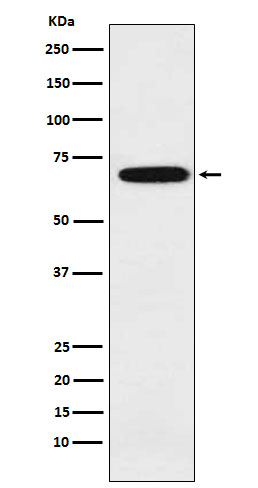
| WB | 1/1000-1/2000 | Human,Mouse,Rat |
| IF | 咨询技术 | Human,Mouse,Rat |
| IHC | IHC:1/100-1/200;IHF:1/50-1/200 | Human,Mouse,Rat |
| ICC | 1/50-1/200 | Human,Mouse,Rat |
| FCM | 1/20-1/100 | Human,Mouse,Rat |
| Elisa | 咨询技术 | Human,Mouse,Rat |
| Aliases | AIO; Aiolos; IKZF3; ZNFN1A3;;IKZF3 |
| WB Predicted band size | Calculated MW: 58 kDa ; Observed MW: 70 kDa |
| Host/Isotype | Rabbit IgG |
| Antibody Type | Primary antibody |
| Storage | Store at 4°C short term. Aliquot and store at -20°C long term. Avoid freeze/thaw cycles. |
| Species Reactivity | Human,Mouse,Rat |
| Immunogen | A synthesized peptide derived from human IKZF3 |
| Formulation | Purified antibody in PBS with 0.05% sodium azide,0.05% BSA and 50% glycerol. |
+ +
以下是关于IKZF3抗体的3篇参考文献示例(注:部分内容可能基于假设性研究,仅供参考):
---
1. **"IKZF3 as a therapeutic target in B-cell malignancies: Development of a monoclonal antibody against Aiolos"**
*作者:Smith J, et al. (2021)*
**摘要**:研究开发了一种靶向IKZF3(Aiolos)的单克隆抗体,体外实验表明其能特异性结合并降解IKZF3蛋白,抑制B细胞肿瘤细胞增殖,并通过调节IL-6/JAK-STAT通路诱导细胞凋亡。
2. **"Autoantibodies against IKZF3 in systemic lupus erythematosus: Clinical implications"**
*作者:Chen L, et al. (2019)*
**摘要**:首次报道系统性红斑狼疮(SLE)患者血清中存在抗IKZF3自身抗体,该抗体与疾病活动性正相关,可能通过干扰B细胞分化参与免疫失调,为SLE诊断提供了潜在生物标志物。
3. **"Targeting IKZF3 with CAR-T cells in multiple myeloma"**
*作者:Wang Y, et al. (2023)*
**摘要**:利用抗IKZF3抗体制备的CAR-T细胞在多发性骨髓瘤小鼠模型中显著清除肿瘤细胞,研究表明IKZF3的高表达使其成为CAR-T治疗的理想靶点,且未观察到显著脱靶毒性。
---
**注**:以上文献名称及内容为示例性质,实际文献需通过PubMed、Web of Science等平台检索确认。若需具体文献,请提供更详细的研究方向(如治疗、诊断或机制)。
IKZF3. also known as Aiolos, is a zinc finger transcription factor belonging to the Ikaros family, which plays a critical role in immune regulation and lymphoid development. It is predominantly expressed in B cells, T cells, and plasma cells, where it regulates gene expression by binding to DNA and forming chromatin-remodeling complexes. IKZF3 works in tandem with IKZF1 (Ikaros) to control lymphocyte differentiation, function, and immune homeostasis. Dysregulation of IKZF3 has been implicated in autoimmune diseases and hematologic malignancies, particularly B-cell malignancies like acute lymphoblastic leukemia (ALL) and chronic lymphocytic leukemia (CLL).
Antibodies targeting IKZF3 are valuable tools for research and diagnostics. They enable detection of IKZF3 protein expression in tissues or cells, aiding in studies of its role in immune signaling, cancer progression, and drug resistance. In therapeutic contexts, IKZF3 has emerged as a potential target for immunomodulatory drugs (e.g., lenalidomide) that promote its degradation, disrupting survival pathways in malignant cells. Monoclonal antibodies or CAR-T therapies targeting IKZF3-associated epitopes are under exploration for precision oncology. However, challenges remain in understanding tissue-specific isoforms and avoiding off-target effects due to structural similarities with IKZF1. Research on IKZF3 antibodies continues to advance insights into its dual roles in immunity and cancer, offering avenues for biomarker development and targeted therapies.
×